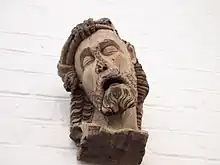страсть
Old Church Slavonic

страсть
Etymology
From Proto-Slavic *strastь, morphologically страдати (stradati, “to suffer”) + -ть (-tĭ).
Noun
страсть • (strastĭ) f
- suffering, anguish, torment
- from the Life of Good King Wencelaus:
- книги ѡ родѣ и ѡ страсти свѧтаго кнѧзѧ вѧчеслава
- knigi o rodě i o strasti svętago knęzę vęčeslava
- A book about the family and suffering of the holy prince Wenceslaus
- “ⱄⱅⱃⰰⱄⱅⱐⰿⰻ (leaf 4, line -6)”, in Codex Zographensis [Глаг. 1] (in Old Church Slavonic), National Library of Russia, 1000±33, page Mt:4:24:
- ꙇ҅ привѣсѧ емꙋ вьсѧ болѧштѧѩ · различьнъꙇми недѫгꙑ · ꙇ҅ страстьми о꙼дръжимꙑ · ꙇ҅ бѣсънꙑѩ · ꙇ҅ мѣсѧчьнꙑѩ зълꙑ недѫгꙑ ꙇ҅мѫштѧ · ꙇ҅ ослабл҄енꙑ жилами · ꙇ҅ ицѣли ѩ ·
- And and they brought unto him all that were sick, holden with divers diseases and torments, possessed with demons, and epileptic, and palsied; and he healed them.
- from the Life of Good King Wencelaus:
- martyrdom (death as a martyr)
- passion, painfully strong emotion
Declension
Declension of страсть (i-stem)
| Case | Singular | Dual | Plural |
|---|---|---|---|
| Nominative | страсть strastĭ |
страсти strasti |
страсти strasti |
| Accusative | страсть strastĭ |
страсти strasti |
страсти strasti |
| Genitive | страсти strasti |
страстью, страстию strastĭju, strastiju |
страстьи, страстии strastĭi, strastii |
| Locative | страсти strasti |
страстью, страстию strastĭju, strastiju |
страстьхъ strastĭxŭ |
| Dative | страсти strasti |
страстьма strastĭma |
страстьмъ strastĭmŭ |
| Instrumental | страстьѭ, страстиѭ strastĭjǫ, strastijǫ |
страстьма strastĭma |
страстьми strastĭmi |
| Vocative | страсти strasti |
страсти strasti |
страсти strasti |
Derived terms
- беспристрастиѥ (bespristrastije)
- бестрастиѥ (bestrastije)
- бестрастьнъ (bestrastĭnŭ)
- добрострастиѥ (dobrostrastije)
- злострастиѥ (zlostrastije)
- любострастиѥ (ljubostrastije)
- многострастьнъ (mnogostrastĭnŭ)
- острастити (ostrastiti)
- подобострастие (podobostrastie)
- пристрастиѥ (pristrastije)
- пристрастьнъ (pristrastĭnŭ)
- рабострастиѥ (rabostrastije)
- равьнострастьѥ (ravĭnostrastĭje)
- сладострастиѥ (sladostrastije)
- страстованиѥ (strastovanije)
- страстовати (strastovati)
- страстоносьць (strastonosĭcĭ)
- страстотрьпиѥ (strastotrĭpije)
- страстотрьпьць (strastotrĭpĭcĭ)
- страстьникъ (strastĭnikŭ)
- страстьница (strastĭnica)
- страстьнъ (strastĭnŭ)
Related terms
- страданиѥ (stradanije)
Russian
Etymology
Inherited from Proto-Slavic *strastь.
Pronunciation
- IPA(key): [strasʲtʲ]
Audio (file)
Noun
страсть • (strastʹ) f inan (genitive стра́сти, nominative plural стра́сти, genitive plural страсте́й)
- passion; obsession
- strong love (between people)
- strong obsession with, attraction to some activity
- the subject of someone's passion
- (religion, plural only) horror; suffering
- стра́сти Христо́вы
- strásti Xristóvy
- Passion
- (plural only) horror (story)
- Что за стра́сти ты расска́зываешь!
- Što za strásti ty rasskázyvaješʹ!
- Quite a horror story that are you telling me!
Declension
Declension of страсть (inan fem-form 3rd-decl accent-e)
Related terms
- страстотерпец (strastoterpec)
- страстоцвет (strastocvet)
- страстной (strastnoj)
- стра́стность (strástnostʹ)
- стра́стный (strástnyj)
References
- Vasmer, Max (1964–1973), “страсть”, in Этимологический словарь русского языка [Etymological Dictionary of the Russian Language] (in Russian), transl. and suppl. by Oleg Trubachyov, Moscow: Progress
This article is issued from Wiktionary. The text is licensed under Creative Commons - Attribution - Sharealike. Additional terms may apply for the media files.